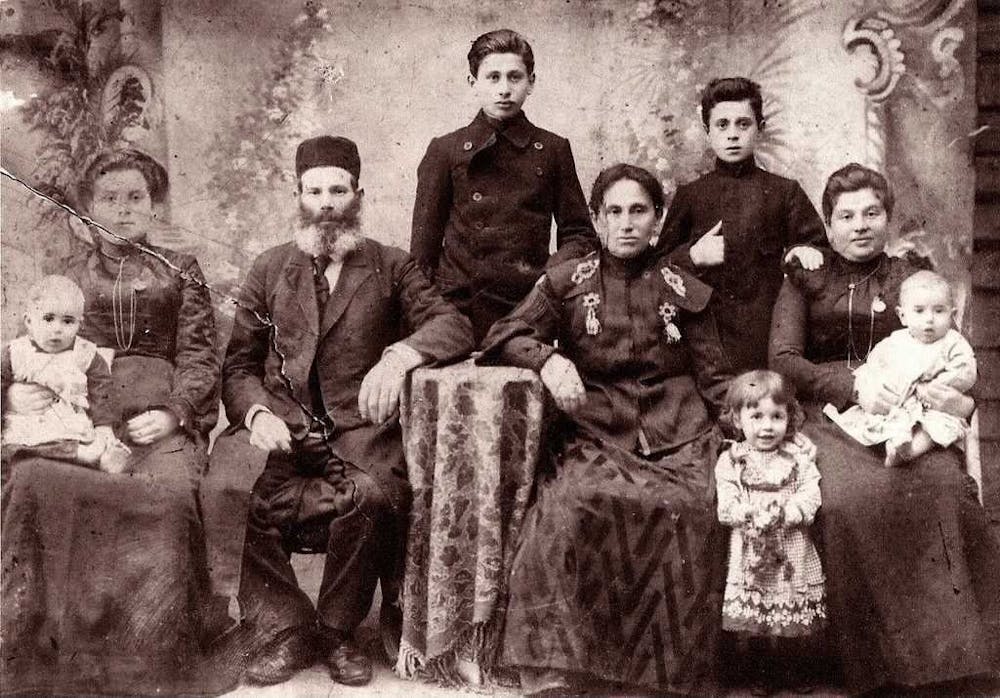Father's Day is not only about celebrating our fathers in the present; it is also about honoring the men that came before us. Father’s Day is a meaningful opportunity to celebrate our family’s fathers for their love, their sacrifice, and their character.
Even centuries after their deaths, our ancestors live on through their stories and the lessons that they can teach us. In this context, I would like to share a couple well-documented tales of my family’s fatherly ancestors to inspire you to learn more about yours. This research was compiled and curated by my Mom’s tireless passion for deciphering our family lineage.
My paternal great-grandfather, Jacob (Kopol) Klubok was born to an Orthodox Jewish family in Novogrudok, Belarus in October 1890, part of the Russian Empire at the time. On June 1, 1908, at the age of 18, with his extended family aboard the Columbia, Jacob immigrated to New York City through Ellis Island, in pursuit of economic opportunity and in order to escape Russia’s violent persecution of Jews. His story is one of courage and bravery — the willingness to drop everything and seek a better life overseas in the face of high risk and potentially no reward.
Jacob later moved to Chicago. In 1921, Jacob was naturalized as an American citizen on Oct. 6, reminding me that my American identity and sense of belonging in this country are thanks to the foundation that Jacob laid as a first-generation immigrant. For me, my Americanness has always been a given, but for those like my great-grandfather, it was a privilege conferred to a chosen few, something I no longer take for granted.
To make ends meet, Jacob became a watermelon and Christmas tree salesman, which was by no means an easy trade. My dad describes Jacob as a “fighter” who would wake up at 4 a.m., have a scotch, and harvest produce that he would bring to Chicago’s South Water Market. Fluent in Russian, Hebrew, and Yiddish — but not English — he also had to overcome the difficulty of persuading American customers to purchase his products. His livelihood depended on his quick-wittedness and adaptability.
He was also forced to succeed in an immensely competitive environment. On June 7, 1930, The Tribune (based in Scranton, Pa.) reported the headline “WATERMELON MERCHANT IS BOMBING VICTIM.” Late the previous night, Jacob’s Chicago watermelon garage was dynamited, supposedly by a business rival. Luckily, Jacob was not killed in the blast.
In spite of this seemingly insurmountable adversity, he persevered and became a renowned salesman in his community. Jacob lives on in my family’s folklore due to his toughness, dedication, and remarkable work ethic. He laid the foundation for his children and his grandchildren to live a better life than the one he lived through, and I will remember his efforts this Father’s Day.
On the other hand, my maternal family history in North America begins in Quebec, during the 1600s. My ninth maternal great-grandfather, Urbain Tessier dit Lavigne, was a prominent pioneer on the island of Montreal. He actually has a street named after him: Saint Urbain Street.
SEE MORE FROM JADEN CLOOBECK:
Urbain was 18 years old when he moved from Château d'Anjou in Tours, France to Montreal on May 17, 1642 and started working as a sawyer, someone who cut down timber for houses. Like Jacob, he moved to a foreign land without a safety net or even the certainty that he would survive.
Urbain also encountered his fair share of hardship in a new country. On May 6, 1651, an Iroquois raid set his house on fire, though he was given compensation for the loss of his house months afterward. A strong man who knew how to shoot, Urbain was a vigorous defender of the fledgling colonial town, which also made him a target to their adversaries. He was taken captive by the Iroquois on March 24, 1660 and was tortured, even getting some of his fingernails torn out. He eventually was liberated and returned to Montreal on August 31, 1661, one year and five months after being captured. After leaving his fighting days behind him and resuming his life as a farmer, he passed away at the age of 65.
Urbain Tessier’s story has taught me the importance of giving back to my community as he once did, building and defending for his town. It has inspired me to have courage in the face of any challenge. I am privileged to live in safer times such that my challenges are not on a battlefield.
Father’s Day is about acknowledging that you are here today thanks to your father and those who came before him. Your ancestors’ willingness to overcome obstacles and support their families is the building block for the life you live today.
So this Father’s Day, I encourage you to spend some time learning about your father. Ask him about what he was like at your age. Maybe even look further along your family tree as I did. There is no better way to spend Father’s Day than to celebrate all your fathers, both past and present.
JADEN CLOOBECK is a College senior from Laguna Beach, Calif., studying psychology. His email address is jaden@sas.upenn.edu.









